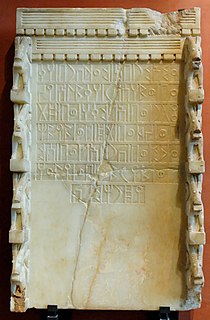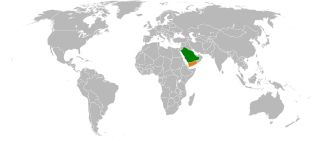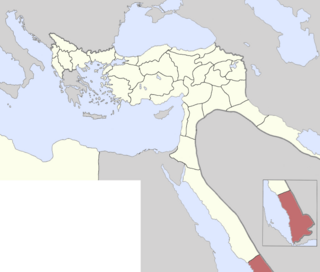
The history of Yemen describes the cultures, events, and peoples of what is one of the oldest centers of civilization in the Near East. Its relatively fertile land and adequate rainfall in a moister climate helped sustain a stable population, a feature recognized by the ancient Greek geographer Ptolemy, who described Yemen as Eudaimon Arabia meaning "fortunate Arabia" or "Happy Arabia". Yemenis had developed the South Arabian alphabet by the 12th to 8th centuries BCE, which explains why most historians date all of the ancient Yemeni kingdoms to that era.

The Armed Forces of Yemen includes the Yemen Army, Navy, 1st Armored Division, and the Yemeni Air Force (2008). A major reorganization of the armed forces continues. The unified air forces and air defenses are now under one command. The navy is concentrated in Aden. The Yemen Arab Republic and the People's Democratic Republic of Yemen joined to form the Republic of Yemen on May 22, 1990.

The Arabian Peninsula is a peninsula of Western Asia, situated northeast of Africa on the Arabian Plate. At 3,237,500 km2 (1,250,000 sq mi), the Arabian Peninsula is the largest peninsula in the world.

Yemen, officially the Republic of Yemen, is a country at the southern end of the Arabian Peninsula in Western Asia. It is the second-largest Arab sovereign state in the peninsula, occupying 527,970 square kilometres. The coastline stretches for about 2,000 kilometres. It is bordered by Saudi Arabia to the north, the Red Sea to the west, the Gulf of Aden and Guardafui Channel to the south, and Oman to the east. Yemen's territory encompasses more than 200 islands, including the Socotra islands in the Guardafui Channel. Yemen is characterized as a failed state with high necessity of transformation. Yemen's constitutionally stated capital is the city of Sanaa, but the city has been under Houthi rebel control since February 2015 as well as Aden, which is also controlled by the Southern Transitional Council since 2018. Its executive administration resides in Riyadh, Saudi Arabia.

Yahya Muhammad Hamid ed-Din became Imam of the Zaydis in 1904 after the death of his father, Muhammad Al-Mansur, and Imam of Yemen in 1918. His name and title in full was "His majesty Amir al-Mumenin al-Mutawakkil 'Ala Allah Rab ul-Alamin Imam Yahya bin al-Mansur Bi'llah Muhammad Hamidaddin, Imam and Commander of the Faithful".

The Aden Protectorate was a British protectorate in southern Arabia which evolved in the hinterland of the port of Aden and in the Hadramaut following the conquest of Aden by Great Britain in 1839, and it continued until the 1960s. In 1940 it was divided for administrative purposes into the Western Protectorate and the Eastern Protectorate. Today the territory forms part of the Republic of Yemen.

Islam came to Yemen around 630 during Muhammad's lifetime and the rule of the Persian governor Badhan. Thereafter, Yemen was ruled as part of Arab-Islamic caliphates, and became a province in the Islamic empire.

Ali Rıza Pasha (1860–1932) was an Ottoman military officer and statesman, who was one of the last Grand Viziers of the Ottoman Empire, under the reign of the last Ottoman Sultan Mehmed VI, between 14 October 1919 and 2 March 1920.
The Al-Haram or Al-Harm are a Bedouin tribe of Saudi Arabia, Sunni Arabs. An Al-Haram myth of origin asserts that they were originally protectors of the Kaaba in the Sacred Mosque or Masjid al-Haram in Mecca.

The Tahirids were an Arab Muslim dynasty that ruled Yemen from 1454 to 1517. They succeeded the Rasulid Dynasty and were themselves replaced by the Mamluks of Egypt after only 63 years in power.

The Ottoman expedition to Aceh started from around 1565 when the Ottoman Empire endeavoured to support the Aceh Sultanate in its fight against the Portuguese Empire in Malacca. The expedition followed an envoy sent by the Acehnese Sultan Alauddin Riayat Syah al-Kahhar (1539–71) to Suleiman the Magnificent in 1564, and possibly as early as 1562, requesting Ottoman support against the Portuguese.
The Treaty of Daan was an agreement signed in October 1911 at Daan in the Yemen Vilayet by a representative of the Sultan of the Ottoman Empire and Imam Yahya Muhammad Hamid ed-Din, the Zaydi Imam of Yemen expanding autonomy in the areas of the Ottoman province inhabited by the Zaydis, and ending the Yemeni–Ottoman Conflicts.
The Alliance of Yemeni Tribes, sometimes referred to as the Yemeni Tribes' Alliance, was an alliance of tribes in Yemen opposed to the government of President Ali Abdullah Saleh. It was formed on 30 July 2011 amidst the civil uprising in Yemen to defend anti-government protesters. Its leader, Sheikh Sadiq al-Ahmar of the Hashid tribal federation, stated his intention to remove Saleh and his sons from power in his capacity as head of the Alliance.

Saudi Arabia and Yemen relations refers to the current and historical relationship between the neighbouring sovereign states of Saudi Arabia and Yemen. The two countries at one time did enjoy good relations and closely cooperated in military, economic and cultural issues. Now because of the ongoing Yemeni Civil War and the realignments of power in the Middle East with the emergence of al-Qaeda and the radicalization of some factions of Islam, Saudi Arabia has led a military intervention into Yemen, alongside a nine-member coalition, backed logistically by the United States, using airstrikes inside of Yemen and commencing a naval and aerial blockade beginning March 26, 2015, in order to support the current government of Abd Rabbuh Mansur Hadi in the war against the Houthis.
The Alwaziri coup, also referred as the Yahia clan coup was a violent dynasty overthrow attempt in the Mutawakkilite Kingdom of Yemen in 1948, which created a great deal of violence and ended with around 5,000 fatalities. During the coup attempt, Imam Yahya Muhammad Hamid ed-Din, the ruler of the kingdom, was killed and the rival Sayyid family, the Alwazirs, seized power for several weeks. Backed by the al-Saud family of Saudi Arabia, the Hamidaddins restored their rule. After deposition of the Alwaziris, the restored monarchy of Imam Yahya was succeeded by his son Ahmad bin Yahya.

The Serb uprising of 1596–1597, also known as the Herzegovina uprising of 1596–1597, was a rebellion organized by Serbian Patriarch Jovan Kantul and led by Grdan, the vojvoda ("duke") of Nikšić against the Ottomans in the Sanjak of Herzegovina and Montenegro Vilayet, during the Long Turkish War (1593–1606). The uprising broke out in the aftermath of the failed Banat Uprising in 1594 and the burning of Saint Sava's relics on April 27, 1595; it included the tribes of Bjelopavlići, Drobnjaci, Nikšić, and Piva. The rebels, defeated at the field of Gacko in 1597, were forced to capitulate due to a lack of foreign support.

The Yemeni–Ottoman conflicts were a series of conflicts between the Ottoman Empire and Zaidi tribes in Upper Yemen, which began in 1538 and ended with the signing of the Treaty of Daan on 9 October 1911.

The Zaraniq rebellion was an rebellion of the Zaraniq Tribe that took place between 1909 and 1910 in the Yemen Vilayet, which was then part of the Ottoman Empire.

The Republic of Turkey and Republic of Yemen have a very long and deep historical ties, spanned from the Ottoman Empire to the modern era. However, their relationship is mostly very complicated with both the Ottoman occupation and Yemeni rebellion against the Turks. Turkey has an embassy in Sana'a, but it closed down in 2015, after the outbreak of Yemeni Civil War. Yemen has an embassy in Ankara.

The 1915 uprising in Karbala was an Arab uprising against the Ottoman Empire that took place in June 1915.















